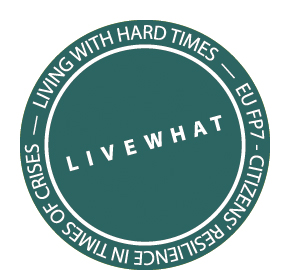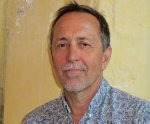CONFERENCE 2015

The LIVEWHAT International Scientific Conference took place in Geneva from Wednesday 14th to Friday 16th October 2015. It was organized by the project coordinator, the Institute of Citizenship Studies (InCite) of the University of Geneva. The aim of the conference was two-fold: to disseminate the project’s findings and to foster exchanges between the LIVEWHAT Consortium and prominent scholars working in the field. The conference was structured around five main themes, reflecting key research dimensions of the LIVEWHAT project.
Theme 1: The interplay of different forms of participation in times of crisis: Research on party politics and protest politics seldom speak to one another. Theme 1 brought together scholars discussing the interaction between political parties, civil society organizations, and social movements. The papers presented dealt with the mechanisms connecting different forms of political participation at the micro-, meso-, and the macro-levels. The panels of Theme 1 addressed: at the macro level, the broader question of the interaction between contentious and party politics and how they influence each other; at the meso-level, questioned the mobilizing capacity of civil society organizations on different policy issues, and; at the micro-level, addressed whether and how citizens engage in and combine multiple forms of participation.
Theme 2: Austerity policies and the governance structure of the economic crisis: The economic crisis has shaped a field of intense grievance and high political salience, which in itself questions the role of political institutions, policy-making, and broader processes of governance. The two panels of Theme 2 offered a comprehensive framework for the study of these processes. The underlying idea was that the political inclusion of different kinds of stakeholders and civil society actors in the public domain can hardly be disconnected from the decisions of elites and institutions in the policy domain. Hybrid processes at the intersection of the public and the policy domain are also evident when political elites become main actors within the ‘national publics’. Panel 1 focused on the complex mixture of laws, policies and different types of arrangements that shape the political context. Attention was also focused on more fluid decisions in the hands of policy-makers, who can intervene to widen, or otherwise restrict, scope for bottom-up political access. Panel 2 took into account a more dynamic model where roles of public challengers and policy insiders are detected in the concrete development of interventions of actors themselves. Governance processes are thus evaluated in the open-ending interplay across politics and society.
Theme 3: Social welfare, family, and non-political resistance to the economic crisis: As a reaction to the current economic crisis, European countries have been implementing significant social policy reforms including the fields of labor market policy, family policy, and social protection systems. However, the directions of these reforms have often been contradictory. On the one hand, significant cuts in social spending as part of the austerity measures have been made; on the other, increased financial support was introduced for families to ease their difficult situation in the crisis. The panels of Theme 5 discussed the directions of welfare regimes’ transformations, particularly the consequences of social policy reforms on social citizenship in Europe.
Theme 4: Economic crisis and the rise of populisms: Populist discourse has become increasingly widespread in Europe over the last decades. While in some countries populist parties, particularly on the radical right, have a relatively long history, in others populist parties seem to have flourished in the context of the economic crisis. Despite the widely held impression that economic recession is a ‘breeding ground’ for populism, the effect of the economy on the prevalence and character of populist discourse remains an open question. The panels of Theme 4 discussed how and under what circumstances the economic crisis affects the rise of populism and the specific forms it might take. The first panel focused on the success of the populist radical right and the appeal of its policy stances, such as opposition to immigration and Euroscepticism. The second panel examined the spread of populist rhetoric in public debate and the rise of populist attitudes among the public.
Theme 5: Social welfare, family, and non-political resistance to the economic crisis: Since the economic crisis of 2008, citizens have responded to economic threats by engaging in a wide repertoire of alternative economic and non-economic practices aligned with solidarity and social economy aims, so as to meet basic needs linked to food, shelter, health, childcare and education that are no longer covered by the respective social policies. At the same time, these alternative practices foster and facilitate new forms of political participation aimed to strengthen open, democratic forms of governance and sustain social economy objectives. They may stem from social movements, labor unions, or other associative structures. The aim of the two panels of Theme 3 was to highlight the interactions between these alternative initiatives, the policies affecting them, the policies influenced by them, as well as the social movement milieu which fosters them.
Keynote Speech
The LIVEWHAT scientific conference was concluded with a keynote speech given by Jonas Pontusson on the topic: ”The Impact of the Economic Crisis on Support for Redistribution in Europe.”
Jonas Pontusson is Professor of Comparative Politics at the University of Geneva in Switzerland. A leading scholar of comparative political economy and the welfare state, he previously taught at Cornell and Princeton. He has been a visiting scholar at the Russell Sage Foundation, the Swedish Collegium for Advanced Study in Social Sciences, and Nuffield College, Oxford. He received the American Political Science Association’s Gladys M. Kemmerer Award for Inequality and Prosperity: Social Europe versus Liberal America (2005) and the Heinz Eulau Award for “The American Welfare State in Comparative Perspective” (Perspectives in Politics, 2006). Jonas Pontusson received his Ph.D. from the University of California-Berkeley.
Conference participants
Eva Anduiza (Autonomous University of Barcelona); Alessandro Arrigoni (University of Oxford); Lorenzo Bosi (Scuola Normale Superiore); Didier Chabanet (SciencesPo); Manlio Cinalli (SciencesPo); Nina Eggert (University of Geneva); Emanuele Ferragina (SciencesPo); Francesca Forno (University of Bergamo); Marco Giugni (University of Geneva); Maria Grasso (University of Sheffield); Riccardo Guidi (University of Pisa); Steven Hauwaert (SciencesPo); Swen Hutter (European University Institute); Stefania Kalogeraki (University of Crete); Bert Klandermans (Free University of Amsterdam); Maria Kousis (University of Crete); Anna Kurowska (University of Warsaw); Jasmine Lorenzini (European University Institute); Lars Meier (TU Berlin); Maria Mexi (University of Geneva); Angeliki Paidakaki (KU Leuven); Takis Pappas (European University Institute); Janina Petelczyc (University of Warsaw); Guillem Rico (Autonomous University of Barcelona); Jochen Roose (University of Wroclaw); Frédéric Royall (University of Limerick); Steven Saxonberg (Masaryk University); Maria Theiss (University of Warsaw); Katrin Uba (Uppsala University); Stijn van Kessel (Loughborough University); Pavlos Vasilopoulos (SciencesPo); Lorenzo Zamponi (Scuola Normale Superiore).
Contact info
For more information on the conference, please contact Professor Marco Giugni, Director of the Institute of Citizenship Studies (InCite), University of Geneva, Boulevard du Pont d'Arve, 40, 1204 Genève. Email: marco.giugni@unige.ch

